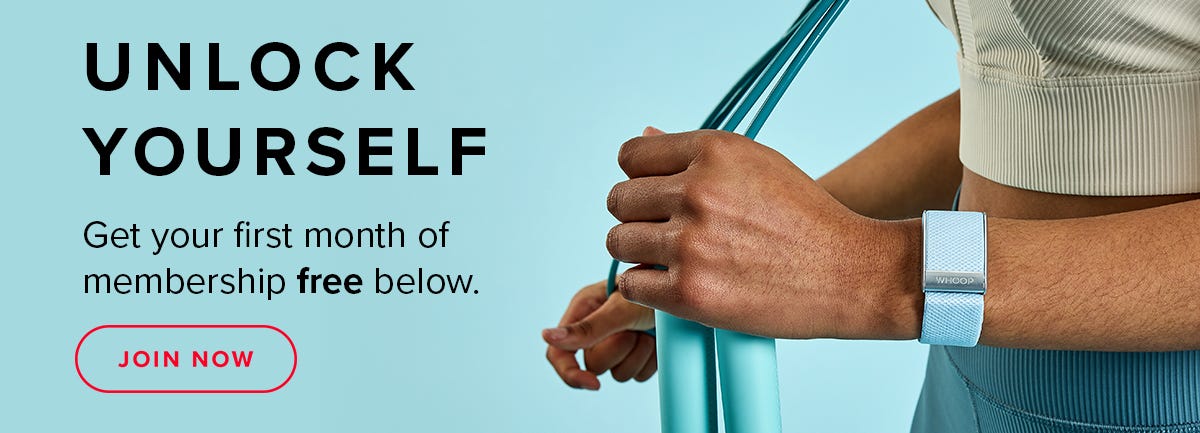The 3 behaviors that hurt my recovery the most
And what you can do about it, if this is you too (spoiler: it probably is)
This issue is sponsored by WHOOP, who gives me the data I need to level up my sleep, stress, and recovery. Join WHOOP today and get a free month!
I’ve been using WHOOP since 2019, and every year, they release more features that help me make the most of my data. To be clear, WHOOP already makes it easy to review and interpret your data; I can get the full picture of my day right on the home screen. But in 2023, WHOOP introduced their AI Coach, which made it even easier to spot big trends and review longer chunks of data at once.
At the end of 2023, I asked WHOOP AI Coach, “What three behaviors hurt my recovery the most this year?” You don’t need a WHOOP to know that these three behaviors probably aren’t great for your recovery either. Here are my top three recovery-wreckers, and how you can circumvent them.
1. Late meals: -7% recovery
I’ve observed that eating late (relative to my bedtime) feels like it disrupts my sleep, but WHOOP confirmed it: Late meals led to a 7% lower recovery number on average.
Digesting food is hard work. Forcing your body to digest a lot of food while you sleep can take energy away from repairing and rebuilding body tissues, consolidating memories, and fighting off infections. Late meals can also lead to an upset stomach, indigestion, or acid reflux. Eating late can also negatively impact sleep, which affects recovery.
WHOOP recommends leaving 2 to 3 hours between your last meal and bedtime. That means I stop eating at 7 PM so I can go drift off to a restful sleep at 9:30 PM. That means I need to get all my calories in earlier in the day, so my stomach isn’t growling at 8:30 PM.
Tip: If your eating window is pushed forward (you’re not hungry until 10 or 11 AM, but ravenous at 9 PM), you need to course-correct. My best tip for this (but you’re gonna hate it) is “no coffee until you’ve had breakfast.” Caffeine is an appetite suppressant, so drinking coffee immediately upon waking can delay hunger signals. Start your morning with a protein-rich breakfast within an hour of waking (even if it’s small), then have your coffee. Continue eating meals every 3 to 4 hours (or whatever works best for your schedule), then “close the kitchen” two hours before bed.
WHOOP helps you do everything better
I’ve been saying for years that you don’t need to be an athlete to benefit from WHOOP. In fact, none of these behaviors have anything to do with my exercise routine! These are data points that anyone could put to use to improve their energy, sleep, stress levels, and health. WHOOP makes it easy to review and analyze your data, and can help you implement that data effectively with their in-app Journal, Stress Monitor, weekly and monthly reviews, and AI Coach.
Start using WHOOP today and get a baseline for your sleep, stress, strain, and recovery. Then, use the data to see how your daily habits are really impacting your health and happiness. Join WHOOP now and get a free month, plus a free WHOOP 4.0 and Black Onyx band.
2. Screens before bed: -7% recovery
I rarely look at my phone before bed; I prefer to read, and do so every night. But sometimes, when I’m very stressed, my concussion symptoms are acting up, or I’m home alone, I’ll pick up my phone once I settle into bed and scroll. And scroll. And scroll. An hour or more may go by, and even if I’m asleep by 9:30 PM, my sleep quality stinks, which impacts my recovery.
We’ve all heard the blue light that comes from our phone, iPad, and TV are bad for sleep. Any light at night can negatively impact the production of melatonin, but blue light is twice as disruptive to melatonin production and circadian rhythm. Better sleep leads to better recovery; experts recommend creating a screen-free (or at least blue-light free) environment for 2 to 3 hours before bed.
Tip: If your phone isn’t in your bedroom, you can’t reach over to mindlessly scroll. Charge it in the kitchen, or if you must have it nearby (for an alarm), plug it in well out of arm’s reach. It’s going to feel really uncomfortable for a few nights, but then it will feel freeing, and I’d be shocked if your sleep didn’t improve. If you want to watch TV before bed (but not in your bedroom, right?), by a pair of blue-light blocking glasses to limit your exposure.
High Stress Zone: -2% recovery
Surprisingly, stress didn’t impact my recovery much—but it’s still in my top 3, outside of concussion symptoms. (Which I’m not sharing, because those aren’t universal.) WHOOP has a daily Stress Monitor which tracks your stress zones (low, moderate, and high) throughout the day. I also log my stress in my Journal (low, moderate, high, very high). When I log high stress days, my recover decreases by 2%, and when I manage my stress well, my average recovery improves by 2%.
Chronic stress sucks for just about everything. It promotes sugar cravings, disrupts your sleep, impairs your gut health and immune system, leads to muscle tension and pain, and certainly plays a big role in your mental health. Reducing stress, on the other hand, will help you sleep, move, feel, and recover better.
Tip: There are a zillion stress management techniques, including breathwork, meditation, journaling, exercise, therapy, walking, and hugs. But let’s start with just two things: Your phone and your nighttime routine. First, no phones (or tablets, or laptops) after dinner, because nothing good happens on Instagram, Twitter, or in your email inbox at 9 PM. Second, create a consistent bedtime routine, starting at the same time every night. Dim the lights or light some candles, do your skincare, brush your teeth, then read, listen to an audiobook or relaxing podcast, journal, color, or meditate until bed.
Putting it together
You don’t need a WHOOP to see how all of these intertwine (although in truth, my WHOOP pulled this together for me in my year-end report in a way I might not have been able to identify on my own). Being stressed leads to nighttime cravings. Raiding the pantry at 10 PM disrupts your sleep, which creates more stress, a lower recovery, and low energy upon waking. Scrolling at night subjects you to blue light (and a-holes on Twitter), further disturbing your sleep, stressing you out, and disrupting your energy, mood, and recovery in the morning. Chugging coffee first thing in the morning perpetuates your need for caffeine and sugar to keep you energized, and shifts your feeding window further out.
The good news is that a few simple shifts can positively impact all of these factors!
No caffeine until after your first meal of the day
Stop eating 2-3 hours before bedtime
No screens (or blue light glasses) 1-2 hours before bed
No phones in the bedroom (or keep them well out of reach)
Maintain a consistent bedtime and nighttime routine
If you only choose one to work on, I’d pick “no screens 2 hours before bed.” Having done it, it’s truly life-changing, and the positive cascade will have your WHOOP showing you in the Green before you know it.
What habit have you (or your WHOOP) noticed negatively impacts your recover? What tip do you have to correct that behavior, and get more days in the Green? XO, MU paid subscribers can share your best observations and advice in comments.
P.S. See all of my WHOOP 101 articles here! (They’re all free.)






I as pushed over the edge to get a Whoop by YOU! I held out because I'm not an "athlete" like you. Your post about Whoop surprising you that your paddle boarding session was more strain than your normal hike did it for me. Curiosity: I wanted to know what my body was really doing that I might not be aware of.
5 months later now I am in SUCH better condition! Whoop showed me what I am physically capable of. I have always thought "okay I worked out for the day" when I do an hour session with my trainer 3x/wk. Turns out that was a warm up for what I can actually do!! I'm really active now, love pushing for that recommended strain. I DON'T love what wine does to my stats/HRV, so I decreased intake heavily and I plan accordingly when a special wine dinner event is on the calendar (by having lots of green days going into it, I end up with one yellow day as a result).
I had NO IDEA how much sleep mattered - I was fine with what I got. But by listening to Whoop podcasts, and pursuing green, I have changed many sleep-related habits & go to bed earlier. I now feel GREAT - I didn't even know what I COULD feel like. THANK YOU, Melissa, for inspiring my better quality of life at 54 yoa! 💚
Great article Mellisa. Disclosure, I love my WHOOP. The biggest factors impacting my recovery are: 1) Alcohol. There is no ok amount for me and this was a wake up call 2) Late meals - not a surprise but the number shone a light on it. 3) Air travel - no matter the distance my body hates it.